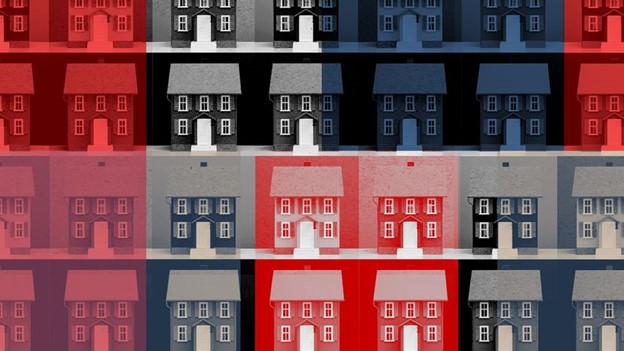Aug 14, 2023
There’s a rumor going around that the housing market has bottomed out—and there’s nowhere for it to go but back up.
However, while the real estate experts that Realtor.com® spoke with acknowledged the market isn’t getting any worse, it’s not getting any better either. It’s like a car stuck in the mud of high mortgage rates and low inventory, spinning its wheels. It’s not sinking down any further into the muck, but it can’t escape it either.
“The housing market is in gridlock,” says Devyn Bachman, senior vice president of research at John Burns Research and Consulting. “Things are moving, but they’re moving very slowly and ineffectually because of how high mortgage rates still are.
The new-home market is faring considerably better than the resale market. That’s likely because some builders are able to buy down mortgage rates for buyers who would otherwise be saddled with rates around 7%.
However, builders can’t put up homes fast enough to alleviate the housing shortage, which has hit crisis proportions. Compounding the problem are homeowners, who have largely been loath to list their properties. There are now many more buyers than there are homes for sale, which is why bidding wars continue to erupt across the country.
Sales have plummeted due to that lack of inventory. In 2021, when mortgage rates fell to record lows in the mid-2% range and COVID-19 pandemic buyers flooded the market, sales of existing homes surged to 6.12 million, according to the National Association of Realtors®. The following year, mortgage rates spiked, briefly topping 7%, and sales dropped down to 5.03 million. This year is on pace for 4.16 million sales, a 17.3% decrease from 2022.
The housing market won’t be able to rebound until more homes hit the market. This isn’t expected to happen until mortgage rates fall to the “magic” mid-5% range, says Bachman.
Rates are expected to remain elevated until the U.S. Federal Reserve decides to stop hiking rates to combat inflation and eventually brings them back down again.
Right now, many homeowners don’t want to sell and give up the ultralow mortgage rates in the 2% and 3% range, which they secured during the pandemic. Once mortgage rates drop, they are likely to be more comfortable selling their homes and buying new ones. That’s expected to get the housing market moving again and increase sales.
“You can’t buy what’s not for sale,” says Odeta Kushi, deputy chief economist at First American Financial Corp., a property title and settlement company that provides data and analytics. “If rates come down, that changes the equation for a lot of people.”
Why the housing market is stuck
Typically, a near tripling of mortgage rates over such a short period would result in lower home prices. Buyers can afford to spend only so much on their monthly mortgage payments—which in July were just over double what they were three years earlier for the same property.* While higher home prices certainly contributed to those heftier bills, more than half of that increase was due to higher mortgage rates.
Many buyers have been forced to move farther out, purchase smaller homes, or buy fixer-uppers as they can no longer afford the homes that were solidly within their price ranges just a few years earlier. Other would-be buyers have been priced out.
That diminishing demand and higher rates should have pushed home prices down. But prices came down only 0.9% in July from the previous year, according to the most recent Realtor.com data.
“This market is anything but normal,” says Kushi.
There are simply too many millennials hitting their peak homebuying years who are determined to soldier on despite the financial challenges.
“The number of shoppers out there is lower than there were over the last couple of years—but [the housing] supply has come down even more. It’s making the market feel hotter than it is,” says Ali Wolf, chief economist of the building consultancy Zonda. “The few homes that are available are selling quickly and at or above list price.”
Homeowners listing their properties today are generally doing so because they need to put their properties on the market. These homeowners might be undergoing a divorce, have a death in the family, be moving for a job, need more space to accommodate a new child or aging parents moving in, or be relocating for retirement.
But those aren’t enough properties to get the housing market moving again.
“In order for the market to recover, we need more inventory. The only way we’re going to receive that inventory is if or when mortgage rates retreat,” says Bachman.
The new-home market has recovered
The bright spot in today’s housing market is new homes. Some builders are prioritizing putting up smaller homes, which are more affordable. Those homes are particularly attractive to first-time buyers. Also, builders are more likely than homeowners to cut prices to make a sale, as they’re less emotionally attached to their abodes. And they can offer all sorts of incentives, such as larger lots, nicer finishes, and upgrades throughout a property.
Perhaps most importantly, though, larger builders also often have financing arms. That makes it easier to buy down mortgage rates temporarily or even permanently in some instances.
“New construction has turned the corner, but the resale markets are in a stalemate,” says Bachman. “Builders can offer the better deal right now.”
Every month this year, the number of permits authorized to erect new single-family homes has gone up, points out Robert Dietz, chief economist of the National Association of Home Builders. However, the number of permits is still a little below last year’s tally.
Dietz cautions that the new-home market could still experience a slowdown ahead with higher interest rates for development and new-construction loans. If mortgage rates continue to rise, that would also hurt new construction.
“As [mortgage] interest rates have moved higher during July, some prospective buyers have been priced out of the market, reducing buyer traffic for builders,” he says.



